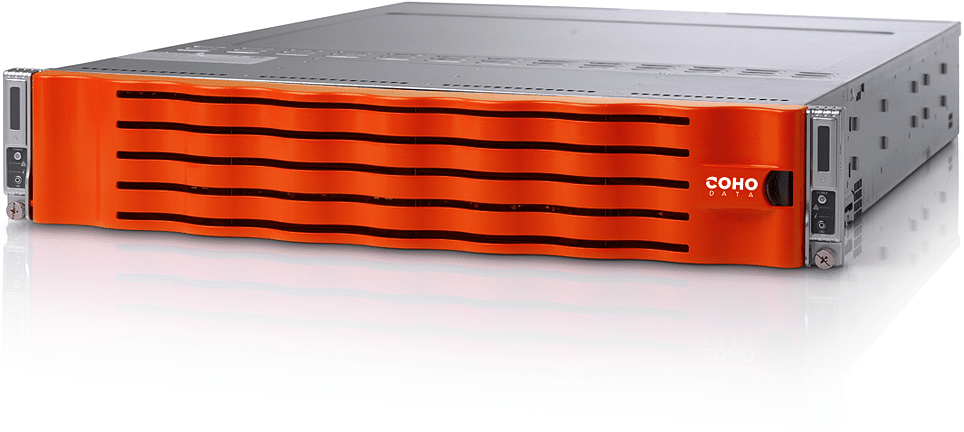 Coho Data has recently “emerged from stealth mode” and announced their core storage product, Coho DataStream. Coho DataStream is an on-premises solution but it has the advantages of the public cloud: pay-as-you-grow economics, rapid scaling, and high resiliency. The Coho DataStream uses a software-defined approach as opposed to traditional legacy hardware; Coho used commodity hardware and combines it with software that is tuned for PCIe flash technologies that can deliver twice the price/performance of all-flash arrays. This unique architecture gives Coho a level of scale and predictable high-performance that up until now was uncommon.
Coho Data has recently “emerged from stealth mode” and announced their core storage product, Coho DataStream. Coho DataStream is an on-premises solution but it has the advantages of the public cloud: pay-as-you-grow economics, rapid scaling, and high resiliency. The Coho DataStream uses a software-defined approach as opposed to traditional legacy hardware; Coho used commodity hardware and combines it with software that is tuned for PCIe flash technologies that can deliver twice the price/performance of all-flash arrays. This unique architecture gives Coho a level of scale and predictable high-performance that up until now was uncommon.
Coho Data has recently “emerged from stealth mode” and announced their core storage product, Coho DataStream. Coho DataStream is an on-premises solution but it has the advantages of the public cloud: pay-as-you-grow economics, rapid scaling, and high resiliency. The Coho DataStream uses a software-defined approach as opposed to traditional legacy hardware; Coho used commodity hardware and combines it with software that is tuned for PCIe flash technologies that can deliver twice the price/performance of all-flash arrays. This unique architecture gives Coho a level of scale and predictable high-performance that up until now was uncommon.

Coho is taking a different approach to storage hardware. While there have been major advancements in various types of data technology (flash, virtualization, and cloud come to mind) the basic storage architecture hasn’t really changed much and the industry has to relay on this older architecture for their storage needs (big monolithic arrays that haven't changed much in three decades). Coho built the virtualization layer that powers Amazon’s EC2 and saw the potential of web-scale architecture used in data storage.
Using software-defined networking (SDN) features, Coho can extract that most performance out of commodity hardware. The modular building blocks of Coho DataStream are based on open commodity hardware. Each 2U chassis contains two dense MicroArray modules composed of PCIe SSDs and disk drives with a dedicated controller and redundant power supplies. Each MicroArray can deliver 90K IOPS or 180K IOPS per chassis (with an 80/20 read/write, 4K block size workload). The MicroArrays provide a balanced ration of CPU, network, PCIe Flash, and Hard Drives to eliminate bottlenecks while unleashing the full performance of flash.
Each MicroArray has a Data Hypervisor installed designed specifically for high-performance flash. The Data Hypervisor creates a Bare-Metal Object Store enabling the underlying storage hardware to be shared by multiple tenants over several protocols with arbitrarily many sparse objects that can be of any size, allowing a variety of applications types to be scaled without static storage tiers.
The MicroArrays are aggregated using the OpenFlow-enabled DataStream 10GbE switch, supporting active/active redundant configuration. The SDN features on the DataStream Switch enable key storage system logic including data placement, routing, load balancing and a distributed protocol service to be delivered from the network itself. Through this use of SDN the system can maintain low latency even as it is scaled from one MicroArray to many.
Data Profiles are used to define data performance within the DataStream architecture. Different applications, sitting across different islands of storage within the data center, can be brought together enabling applications to directly access data whether it is from a virtualized server via VMware NFS, a physical DB via standard NFS, or a media application via HTTP. All of these types of data profiles can coexist on a single DataStream Switch and can be access with low latency.
As the need for scale increases users can just add another 2U, 40TB, chassis. The initial setup can be done in under 15 minutes and each additional chassis that is added will seamlessly integrate with the previous system regardless of the improvements made to the new system. With each new chassis users can expect an increase in both capacity and performance, at a lower cost, in a smaller footprint. For example: an 11U unit would provide 190TB capacity, 900K IOPS, all at a list price around $530,000.
Coho DataStream features include:
- Unparalleled performance, with up to 180K IOPS per 2U Coho DataStream appliance businesses use the appliance for all sorts of applications regardless of requirements.
- Open scalability, offering multi-generation hardware compatibility, through open, commodity hardware and standards like OpenFlow for software-defined networking gives businesses tremendous hardware flexibility and allows them to ride the "communization curve."
- Pay-as-you-grow economics, businesses can start with a single Coho DataStream chassis of 40TB for $2.50/GB (before deduplication and compression) and add as they grow eschewing the large upfront expenditures of traditional arrays and avoids forklift upgrades.
- Simply storage, setup, and management, with 10-minute installation times, Coho DataStream works with businesses of any size in a scalable, cost-effective, and easy to manage store solution.
Availability
Coho DataStream will be generally available later this year.
